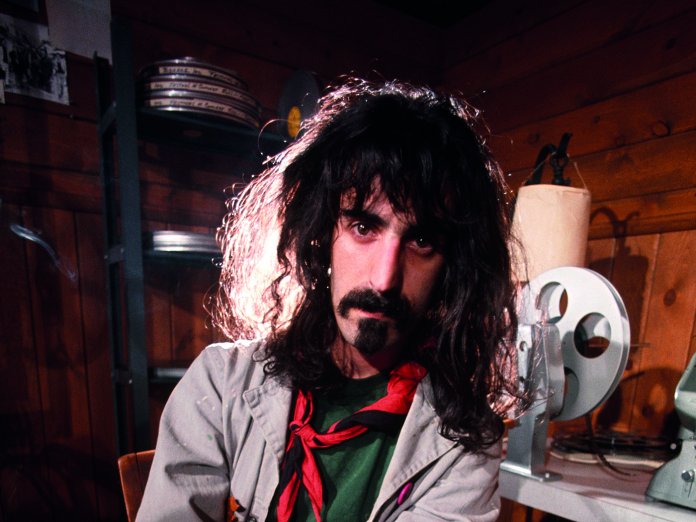There aren’t many musicians harder to squeeze into documentary film format than Frank Zappa. With 62 albums released during his lifetime, plus dozens more after his 1993 death, and a musical style that combines compositional complexity with sophomoric humour, Zappa’s career is impervious to toda...
There aren’t many musicians harder to squeeze into documentary film format than Frank Zappa. With 62 albums released during his lifetime, plus dozens more after his 1993 death, and a musical style that combines compositional complexity with sophomoric humour, Zappa’s career is impervious to today’s playlist and streaming doc synopses.
In his film, director Alex Winter represents this impossible task by returning again and again to the Zappa archives, shelves stacked floor to ceiling with audio and video tape in the basement of his former home. But the 129-minute film largely punts on trying to wrap its arms around the voluminous output of Zappa’s short life, creating instead a character study of the singular, irascible and obsessively creative musician.
The musician who is driven to work at all personal costs is a hoary rock-pic cliché, but if anyone earned it, it’s Zappa. A majority of the archival footage finds the lanky Rasputin figure rehearsing his band, hunched over notation paper, or conducting live concerts – often with his middle finger. The film is cut like you’re inside his restless imagination, with brief flashes of monster movies, gas masks from his youth growing up next to an Army chemical plant and graphic claymation.
The movie also lets Zappa himself – never shy in interviews – do most of the talking; it’s 20 minutes before you hear from anyone else. There’s good reason for that, as Zappa kept nearly everyone at arm’s length throughout his career. A lengthy roster of band members is introduced in concert footage, most with a very short timeline of collaboration noted beneath their name. Guitarist Steve Vai says Zappa saw his fellow musicians as “a tool for the composer”, while Zappa himself admits in one interview that he has no friends, only a family that he rarely sees between tours.
In the context of rock history, Zappa is also portrayed as a man apart. While The Mothers Of Invention had all the trappings of late-’60s hippiedom, their thorny music is laughably incongruous with the writhing dancers at the Whisky A Go Go. Zappa famously didn’t do drugs, carried a very severe political and artistic ethos at odds with the loosey-goosey vibes of the time and was more concerned with intricately scripted music and theatrical hijinks than jamming out.
The film honors this preferred identity, that of a 20th-century composer inspired by Varese and Stravinsky, who largely used the musical tools at hand to realise his vision: the electric guitar and whatever genre was currently popular, be it psych-rock, jazz fusion, prog, or new wave. One of the longest live clips included doesn’t feature Zappa at all, but the Kronos Quartet, performing a Zappa piece and comparing him to Ives, Partch and Sun Ra. At one point he flat out hires the London Symphony Orchestra to record some of his symphonic work, then throws shade on them to David Letterman.
That no-bullshit prickliness served Zappa well in his eternal battles with the record industry and his unlikely late-life roles as free-speech spokesman and musical ambassador to Czechoslovakia after the Velvet Revolution. All these chapters are given considerable screen time – they’re easier to explain than the plot of 200 Motels or Joe’s Garage – and his media and Congressional hearing campaign against the pearl-clutching censors of the Parents Music Resource Center remains heroic even if you don’t care for his music.
And if you don’t, Zappa doesn’t make a very strong case for giving it another chance. Documentaries shouldn’t necessarily be commercials for their subjects, but the film never really sells why anyone unfamiliar with his heady concepts and absurd lyrics should reconsider; his songs are even more disorienting and impenetrable when cut up and combined with the rapid-fire visual editing. Apart from the unlikely novelty hits of “Dancin’ Fool” and “Valley Girl” – both of which Zappa dismisses, natch – there’s little to suggest why he earned progressively larger crowds and a devoted following.
But even at that remove, the film hits its emotional climax with Zappa’s final concert, conducting the Ensemble Modern in Germany. In the rehearsals leading up to the event and the performance itself, Zappa, fighting the prostate cancer that would kill him at only 52, finally appears satisfied (mostly) with the quality of the musicians reproducing the music in his head. Then he walks backstage and sits alone, while the crowd cheers on. It’s an oddly moving Mr Holland’s Opus ending for a subject even a sympathetic filmmaker has depicted as relentlessly cold and unsentimental.
“You must have been thrilled?” an interviewer asks about the 20-minute ovation at the final show.
“I was happier that they did that rather than throw things at the stage,” Zappa replies.
Zappa is available to watch now in the UK & Ireland by clicking here



